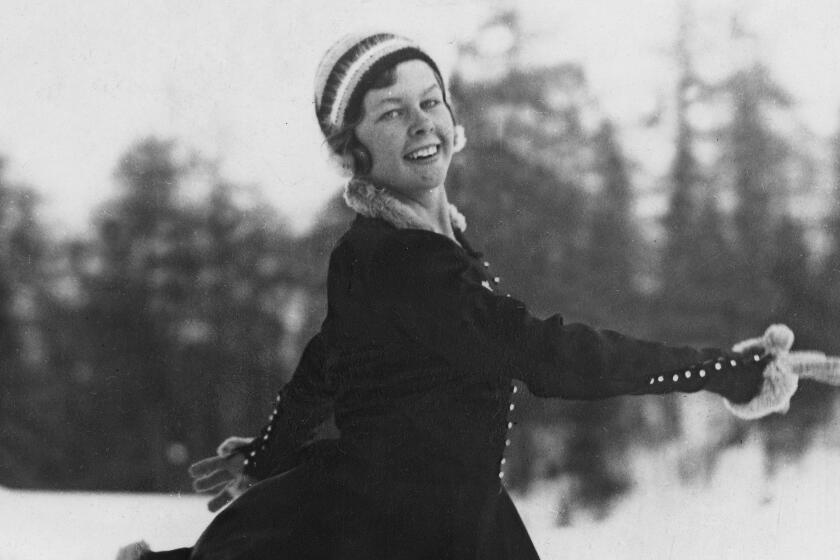THE SEOUL GAMES : Fencing : ‘Bout Dumping’ Is Open Practice, but Some Want to Foil the Cheaters
Fencing, as old as the Pyramids, is subject to another ancient art: cheating.
In baseball or football, unfair play or throwing games would cause a scandal. In the select society of fencing, there’s barely a whimper about a foul bit of foiling.
Some loyalists admit it’s done but see nothing wrong with the “bout dumping” which occurs when one contestant deliberately loses to a teammate or allows an otherwise likable opponent to gain points. It’s more like an accommodation.
But things have been known to get nasty, like ganging up on a politically objectionable competitor or hot-wiring a foil to fraudulently register points.
“You look around at the pools of fencers and you see them talking to each other,” says U.S. captain Carl Borack of Staten Island, N.Y., a former Olympian himself. “They are saying, ‘If in our last bout you’re up and I need it you’ll give it to me, and if I’m up and you need it I’ll give it to you. If we both need it then we’ll fence.’ ”
Borack says the practice is more common abroad than in the United States, and concern about it does seem to be growing.
Last May in Madeira, Portugal, 1984 Olympic sabre gold medalist Jean-Francois Lamour and Phillippe Riboud, an epee champion, complained that bout dumping had become rampant and implored the fencing congress to help eliminate the practice. A committee was appointed to study the matter.
Many find it an uncomfortable topic of discussion.
Aladar Kogler, a U.S. Olympic coach from Columbia University and the head Soviet Olympic coach from 1965-81, recoiled when asked about the practice and refused to answer.
“In the final analysis the strong move up. The person who suffers is the one who has made himself vulnerable for it,” said Albert Axelrod of New York, a five-time U.S. Olympian and bronze medalist in 1960 who said he lost a match at Helsinki in 1952 when “suddenly the judges became blind” after he was leading.
Caitlin Bilodeaux of Concord, Mass., two-time U.S. national champion and a gold medal winner at the 1987 Pan Am Games, said, “I’ve seen it happen so many times. It’s happened to my husband three or four times this year.” She’s married to top Canadian sabre fencer Jean-Marie Banos, who is also at the Olympics.
In 1984, the issue embroiled Robert Stull, who is the only member of the U.S. Olympic team in two sports at Seoul.
There were charges that several athletes intentionally lost to Stull, of Austin, Texas, so that he would make the modern pentathlon team. An arbitrator ruled for Stull, but Stull ended up an alternate when the 1984 Games began. He is on both the epee and the modern pentathlon team in Seoul.
Mary Jane O’Neill of Concord, Mass., a member of the U.S. women’s Olympic foil team, feels that she was a victim of a conspiracy to gang up on her in a recent World Cup competition.
One of the tournament favorites, a West German, had to win a bout against an East German by 5-1 or 5-0 to remain in the tournament and keep O’Neill from moving up. The East German lost by the required margin.
“I actually talked to her (the East German),” O’Neill said. “I said, ‘Don’t do it, it’s for the Olympics.’ I think she understood, but she threw it anyway.”
Other fencers have gone even further. A Soviet pentathlete, Boris Onischenko, was caught using a doctored weapon, rigging what is called a bridge in the handle of the sword. All he had to do was press two wires together and it triggered a light on the scoreboard indicating he had made a touch.
And saber matches, which will be electronically scored in future Olympics as well world championships, have been known to trigger near riots over judging.
In the 1984 Olympics, a final was disrupted for nearly a half hour and the stage cleared, all because of disagreement over a touch. After the match, sabre final silver medalist Marco Marin of Italy accused gold medal winner Jean-Francois Lamour of cheating. A fight nearly broke out and Marin recanted, saying it was actually the judges who cheated.
Could the intrigue carry over to Seoul?
“I don’t think you can buy bouts in the Olympics,” Borack said. “What might happen is with an Eastern European who is up in the pool for sure. You might see a deal go down for the Eastern European to lose a bout as long as he knows he’s up.”
More to Read
Go beyond the scoreboard
Get the latest on L.A.'s teams in the daily Sports Report newsletter.
You may occasionally receive promotional content from the Los Angeles Times.





